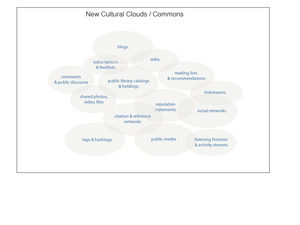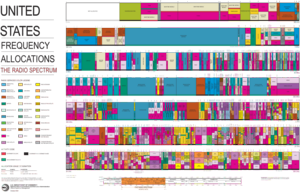Cultural Clouds: A New Kind of Commons?
There’s a lot of buzz about cloud computing in the technology world these days, but I think something much more interesting is the emergence of cultural clouds as the newest kind of public commons. By cultural clouds, I’m talking about the new layer of the human cultural stack we’re busy laying down as a by product of all our social and creative activities in the inofverse.
To be clear, I’m not referring to the IT infrastructure layer wherein cloud computing is defined as the “style of computing where massively scalable IT-related capabilities are provided ‘as a service’ across the Internet to multiple external customers.” [Thanks Gartner, via BusinessWeek]
These new cultural clouds appear in the ever growing collections of crowdsourced collectively or socially accumulated judgements, cultural products, knowledge, history, relationships, etc., encoded in the form of managed digital information. This quick illustration shows some of the pools of activity and judgement that that make up these cloud commons; including wikis, public media, reputation statements, reading recommendations, social networks, wish lists, music listening histories, shared photos, films and videos, citation networks, geotagging and memory maps, comments and public discourse, hashtags and tags for photos, URLs, and songs, link streams, subscription and feed lists, blogrolls, etc. These are social, cultural, and conversational resources, not mineral deposits or physical topographies.
New Cultural Clouds / Commons

The commons is an old construct that embraces natural resources – think land, air, water, the electromagnetic spectrum – and the more recent public domain of cultural materials not governed by copyright law.
Venerable institutions of custom and law, such as seasonal access to pasturage, the right of passage across borders for nomadic peoples, and common law, define and regulate the recognized forms of commons.
But socially collected, digital, reified human cultural products and judgements are a new *type* of commons. I think they’re a new type of resource, brought forth largely by the cognitive surplus we enjoy. And as profound technological permeation and ubiquitous computing bring on the age of everyware, the cloud commons will grow (and fragment / specialize / multiply?).
Who and what will govern the new cloud commons? How will we define and manage these resources?
By form and makeup, the cloud commons is ephemeral and distributed. But as digital information, it is eminently tangible and actionable. Our basic social structures and mechanisms – science, the law, economics, art, agriculture, religion, technology – will recognize the emergence of cloud commons, and respond accordingly. APML (Attention Profiling Markup Language), from the APML Working Group, is an example. The DataPortability project – “a group created to promote the idea that individuals have control over their data by determining how they can use it and who can use it. This includes access to data that is under the control of another entity.” – is another. [Advocating for the right to free movement of data is a digital analog of the ancient idea of right of way.] OpenID, OpenSocial, OAuth, OPML, and the rapidly evolving Creative Commons licensing system are other examples of responses to the appearance of cloud commons.
What does the future hold? As recognition of cloud-based commons grows, expect to see all the patterns of activity typical of new frontiers and zones of instability: wildcatting, pioneering, piracy, squatting, privateering, enclosure, slums and shanty towns (informal settlements in the parlance of architecuter and urban planning) extractive industries, sovereign claims, colonization, speculation, etc.
With history as a guide, I’m especially wary of enclosure movements, and extractive industries. Both practices can rapidly diminish the present value of a commons or commons-based resource. Worse, enclosure and extractive practices act as negative feedback mechanisms, decreasing current estimations of a commons or commons-based resource’s future value, making the tragedy of the commons a likely outcome scenario.
The U.S. radio spectrum, as enclosed by the FCC

Is this framing of recently formed clouds of information and activity data as a new kind of commons accurate? Useful?
More on the idea of cultural clouds as the new commons forthcoming.